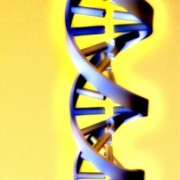 Photo: Getty Images
Photo: Getty Images
The causes of autism are still unknown, but studying genetic factors has been yielding some fruit in recent years, uncovering some of the genes that play a role in autism.
Genomics is the study of genes and how they function. Genomics examines the structure of the genome, mapping genes and sequencing DNA. The genome is the hereditary material of an organism.
Research on the genomics of autism from the Center for Biomedical Informatics at The Children's Hospital of Philadelphia indicated that several genes and genomic variants contribute to autism. The gene alterations are rare but when they are in play, they seem to disrupt genes that are significantly involved in brain development and nerve signaling.
A news item from the website Medical News Today, published on March 2, 2011, reported that this study could be found online in the journal Molecular Psychiatry.
According to the September 15, 2010 issue of Science Translational Medicine, males with certain DNA alterations to their X-chromosome are at high risk of having autism.
This research was performed at the Centre for Addiction and Mental Health (CAMH) and The Hospital for Sick Children (SickKids), in Toronto Canada.
One percent of boys with autism involved in the study had mutations in the PTCHD1 gene on the X-chromosome. No boys without autism showed this mutation.
Girls who also had this mutation did not seem to exhibit autistic traits. It appears that girls may be protected from developing autism because they have a second X-chromosome.
Still these girls could be carriers, passing on the mutation to their children. Their sons could then have autism.
Researchers from UCLA's David Geffen School of Medicine and Semel Institute for Neuroscience and Human Behavior, participated in a study by the Autism Genome Project. The Autism Genome Project is an international association of scientists from 12 different countries, representing 60 institutions.
Certain rare genetic variants were found 20 percent more in children with autism than in other children. Researchers also discovered new disruptions, where a child of non-autistic parents had autism. It appears that some children have private genetic mutations not passed on genetically, and this leaves them more susceptible to autism.
Interestingly, each child showed a different disturbance in a different gene.
Investigation of these genes revealed that there were categories emerging that were more prone to being affected by the mutation. This research was published in the June 9 online issue of the journal Nature.
Researchers hope to gain more information as they identify groups of disrupted genes. Ultimately they hope to be able to develop treatments for autism.
Resources:
Gene Variants In Autism Linked To Brain Development
http://www.medicalnewstoday.com/articles/217863.php
Link to Autism in Boys Found in Missing DNA
http://www.sciencedaily.com/releases/2010/09/100915150951.htm
DNA scan for familial autism finds variants that disrupt gene activity in autistic kids
http://newsroom.ucla.edu/portal/ucla/world-s-largest-dna-scan-for-familial-159750.aspx
Autism Study Reveals a 'DNA Tag' (Methylation) Amenable to Treatment
http://www.sciencedaily.com/releases/2010/04/100408123245.htm
Visit Jody's website and blog at http://www.ncubator.ca and http://ncubator.ca/blogger






Add a CommentComments
There are no comments yet. Be the first one and get the conversation started!